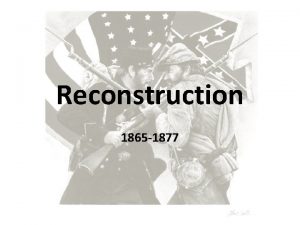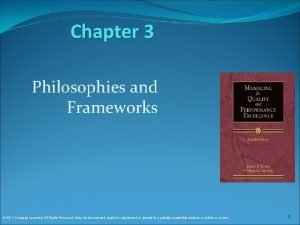Reconstruction A Political Trilogy Presidential Reconstruction As soon













- Slides: 13

Reconstruction: A Political Trilogy

Presidential Reconstruction As soon as ten percent of those who had voted in 1860 took this oath of allegiance, a confederate state could form a new state government and send representatives and senators to congress. Under Lincoln’s terms, three states – Arkansas, Louisiana and Tennesseemoved toward readmission to the union. Johnson pardoned more than 13, 00 former Confederates because he believed that “White men alone must manage the South…”

Lincoln’s Assassination

The Radical Republicans The Radicals, led by Senators Charles Sumner of Massachusetts and Rep. Thaddeus Stevens of Pennsylvania wanted to destroy the political power of former slaveholders. Most of all they wanted African Americans to be given full citizenship and the right to vote. Thaddeus Stevens

Congressional Reconstruction • In December 1865, the newly elected Southern legislators arrived in washing, Congress, however refused to admit the new southern legislators. At the same time moderate republicans pushed for new laws to remedy weaknesses they saw in Johnson’s plan. In 1866, Congress voted to enlarge the Freedman’s Bureau and passed the Civil Rights Act of 1866. The law gave Africcan. Americans citizenship and forbade states from passing discriminatory laws-black codes- that severely restricted African Americans lives.

Freedmen’s Bureau Freeman's Bureau The Freeman's Bureau was established by Congress on 3 rd March, 1865. The bureau was designed to protect the interests of former slaves. This included helping them to find new employment and to improve educational and health facilities. In the year that followed the bureau spent $17, 000 establishing 4, 000 schools, 100 hospitals and providing homes and food former slaves. The Freeman's Bureau also helped to establish Howard University in Washington in 1867. Instigated by the Radical Republicans in Congress it was named after General Oliver Howard, a Civil War hero and commissioner of the Bureau of Refugees and a leading figure in the Freeman's Bureau.

The Civil Rights act of 1866 • • • April 9, 1866 A. D. Civil Rights Act of 1866 39 th United States Congress Long title: CHAP XXXI. — An Act to protect all Persons in the United States in their Civil Rights, and furnish the Means of their vindication. Authored by: Introduced by: Dates Date passed: House: April 9, 1866 Senate: April 6, 1866. Date signed into law: 1866 Amendments: Related legislation: The Civil Rights Act of 1866 is a federal law in the United States declaring that everyone born in the U. S. and not subject to any foreign power is a citizen, without regard to race, color, or previous condition of slavery or involuntary servitude. As citizens they could make and enforce contracts, sue and be sued, give evidence in court, and inherit, purchase, lease, sell, hold, and convey real and personal property. Persons who denied these rights to former slaves were guilty of a misdemeanor and upon conviction faced a fine not exceeding $1, 000, or imprisonment not exceeding one year, or both. The activities of organizations such as the Ku Klux Klan undermined the workings of this act and it failed to guarantee the civil rights of African Americans. This statute does not cover visitors, diplomats, and Native Americans in the United States on reservations. It was aimed at the Freedmen (freed slaves) and was a major policy during Reconstruction. It was vetoed by President Andrew Johnson[1], then passed over his veto by Radical Republicans in Congress. [2] Parts of the act continue in effect in the 21 st century, in the United States Code: [3] "All persons within the jurisdiction of the United States shall have the same right in every State and Territory to make and enforce contracts, to sue, be parties, give evidence, and to the full and equal benefit of all laws and proceedings for the security of persons and property as is enjoyed by white citizens, and shall be subject to like punishment, pains, penalties, taxes, licenses, and exactions of every kind, and to no other. " This is based on section one of the 1866 act. [4]

The Reconstruction Act of 1867 • • The acts' main points included: Creation of five military districts in the seceded states not including Tennessee, which had ratified the Fourteenth Amendment to the United States Constitution and was readmitted to the Union Requiring congressional approval for new state constitutions (which were required for Confederate states to rejoin the Union) Confederate states give voting rights to all men. All former Confederate states must ratify the 14 th Amendment President Andrew Johnson's vetoes of these measures were overridden by Congress. Later, when the case Ex Parte Mc. Cardle came to the Supreme Court, Congress feared that the court may strike the Reconstruction Acts down as unconstitutional, at which point Congress repealed the Habeas Corpus act of 1867 to revoke the Supreme Court's appellate power to hear the case.

The Impeachment of Andrew Johnson • • After President Johnson notified Congress on February 21, 1868, that he had removed Edwin Stanton as Secretary of War and replaced him with Adjutant. General Lorenzo Thomas, it took the House of Representatives only three days to impeach him for "high crimes and misdemeanors. " Meanwhile, Stanton refused to abandon his office and had Thomas arrested for attempting to exercise the duties of the Secretary of War. Johnson’s trial in the Senate, which he did not attend, began on March 23 and was presided over by Chief Justice Salmon B. Chase. There were eleven articles of impeachment. On May 16, the Senate voted on the eleventh article, which included many of the charges contained in the preceding articles. Johnson was acquitted by one vote; the 35 -19 count was just short of the necessary two-thirds majority. Harper’s Weekly had its own artist, Theodore Davis, draw up many scenes of the impeachment process and drama; they included detailed illustrations, drawn to scale, of both the House and the Senate in session.

Constitutional Reconstruction • The 13 th, 14 th, and 15 th Amendments to the U. S. Constitution are referred to as the “Reconstruction Amendments. ” Each amendment addressed specific issues regarding Southern slavery, citizenship, and suffrage. Of the three, the 14 th Amendment is still applied in contemporary cases that violate the “equal protection” clause. All three amendments radically altered the social and political landscape of American society at a time the Civil War was ending. Although the motives of Radical Republicans crafting the amendments were partisan, their efforts paved the way toward a society that was on the path to a democracy that would ultimately provide absolute equality for every citizen.

Opposition to Reconstruction • • • KU KLUX KLAN The Ku Klux Klan (KKK) is a white supremacist organization that was founded in 1866. Throughout its notorious history, factions of the secret fraternal organization have used acts of terrorism—including murder, lynching, arson, rape, and bombing—to oppose the granting of civil rights to African Americans. Deriving its membership from native-born, white Protestant U. S. citizens, the KKK has also been anti-Semitic and anti. Catholic, and has opposed the immigration of all those it does not view as "racially pure. " Other names for the group have been White Brotherhood, Heroes of America, Constitutional Union Guards, and Invisible Empire. Nathan Bedford Forrest (July 13, 1821 – October 29, 1877) was a lieutenant general in the Confederate Army during the American Civil War. He is remembered both as a selfeducated, innovative cavalry leader during the war and as a leading southern advocate in the postwar years. He served as the first Grand Wizard of the Ku Klux Klan, 1]

Southern Redemption • The Amnesty Act of May 22, 1872 was a United States federal law that removed voting restrictions and office-holding disqualification against most of the secessionists who rebelled in the American Civil War, except for some 500 military leaders of the Confederacy. The original restrictive Act was passed by the United States Congress on May 1866. [1] • The 1872 Act affected over 150, 000 former Confederate troops who had taken part in the American Civil War.

The End of Reconstruction • • Congress removed the civilian governments in the South in 1867 and put the former Confederacy under the rule of the U. S. Army. The army then conducted new elections in which the freed slaves could vote while those who held leading positions under the Confederacy were denied the vote and could not run for office. In ten states, coalitions of freedmen, recent arrivals from the North (Carpetbaggers), and white Southerners who supported Reconstruction (Scalawags) cooperated to form Republican state governments, which introduced various reconstruction programs, offered massive aid to railroads, built public schools, and raised taxes. Conservative opponents charged that Republican regimes were marred by widespread corruption. Violent opposition towards freedmen and whites who supported Reconstruction emerged in numerous localities under the name of the Ku Klux Klan, which led to federal intervention by President Ulysses S. Grant in 1871 that closed down the Klan. Conservative Democrats calling themselves "Redeemers" regained control state by state, sometimes using fraud and violence to control state elections. A deep national economic depression following the Panic of 1873 led to major Democratic gains in the North, the collapse of many railroad schemes in the South, and a growing sense of frustration in the North. The United States presidential election of 1876 was and still is one of the most disputed and controversial elections. Samuel J. Tilden of New York outpolled Ohio's Rutherford B. Hayes in the popular vote, and had 184 electoral votes to Hayes's 165, with 20 votes uncounted. . It is generally believed that an informal deal was struck to resolve the dispute: the Compromise of 1877. In return for the Democrats' acquiescence in Hayes's election, the Republicans agreed to withdraw federal troops from the South, ending Reconstruction. The Compromise effectively ceded power in the Southern states to the Democratic Redeemers
 King jesus is coming
King jesus is coming Reconstruction plans venn diagram
Reconstruction plans venn diagram Presidential and congressional reconstruction venn diagram
Presidential and congressional reconstruction venn diagram Presidential and radical reconstruction venn diagram
Presidential and radical reconstruction venn diagram Presidential reconstruction
Presidential reconstruction Presidential and congressional reconstruction venn diagram
Presidential and congressional reconstruction venn diagram What does reconstruct mean
What does reconstruct mean Juran's quality trilogy
Juran's quality trilogy Avaps mode
Avaps mode Juran's quality trilogy
Juran's quality trilogy Juran's quality trilogy
Juran's quality trilogy Juran's quality trilogy
Juran's quality trilogy Oedipus rex trilogy
Oedipus rex trilogy Avaps titration
Avaps titration























